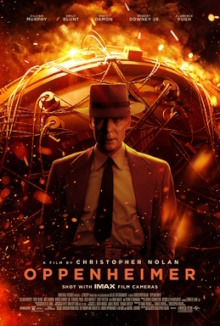Even before it won all those Oscars, I was always going to have to get around to watching this eventually as much as I didn’t relish the prospect of watching a three-hour biopic. Critics have praised Christopher Nolan for successfully framing this as a thriller with the use of jumps in the timeline to add tension and uncertainty yet to my mind it is still a biopic. The unique angle that Nolan adds is elevating the character of Lewis Strauss to serve as the principal antagonist of the film. I understand that this was a major brouhaha at the time but as Nolan observes himself, it really is much ado about nothing. It feels unworthy to make such a big deal out of it and in the same vein, I don’t think very highly of this film either.
The senate confirmation hearing of Lewis Strauss leads to flashbacks about his relationship with J. Robert Oppenheimer. The physicist is introduced as a student who struggles with practical work in England and moves on to theoretical physics in Germany. Feeling homesick, he returns to the US to teach the new field of quantum mechanics in California. He becomes romantically involved with Communist Party member Jean Tatlock but later marries Katherine Puening who he had an affair with while she was already married. When nuclear fission, Oppenheimer realizes that it can be weaponized.US Army Colonel Leslie Groves recruits Oppenheimer to run the Los Alamos Laboratory who is motivated by the urgency to develop a fission bomb before the Nazis. Early on, Edward Teller suggests that such a bomb might ignite the planet’s atmosphere, destroying the world. The film shows Oppenheimer consulting Albert Einstein to discuss the possibility. Meanwhile in 1959, the senators turn Strauss’ confirmation hearing into a trial for his part in bringing about Oppenheimer’s downfall after the war. Strauss is motivated not only by Oppenheimer’s reticence over the development of even more powerful hydrogen bombs but also for what he perceives are personal slights.
This is a huge film with a massive cast of characters and we’re convinced that the very scale of the production explains why it won so many Oscars. There are notable omissions in this account of the beginning of the US nuclear weapons program, such as the role of Arthur Compton who appointed Oppenheimer to take over his part of the Manhattan Project and who was the person he spoke to about the possibility of an unstoppable chain reaction. Yet there are so many people in it already that it’s forgivable. As a Nolan film, it of course looks great and moves a good clip while making everything reasonably understandable. I will note that Nolan’s insistence on using minimal CGI actually has the Trinity test explosion looking not that impressive and the makeup on the actors at the end to age them looks horrible. I’d even say that Nolan tries so hard to make things easy for the audience that it amounts to belittling hand-holding. Oppenheimer and Jean have a key conversation together completely naked so the audience knows that he lusts for her. When questioned by an aide, Strauss explains exactly what he did to Oppenheimer and why. Just how many times do they need to mention that the risk of destroying the world in that first test is near zero but not zero? Given Nolan’s reputation for making films that are difficult to parse, it’s amusing how he has chosen to go in the completely opposite direction this time around.
The film sets Strauss up to be the petty little man who is inconsequential next to a great man like Oppenheimer. But is he really such a great man? Even here, Teller points out that he’s more of a politician than a physicist as he neither invented the atomic bomb nor came up with the theories behind it. I’d say he’s a project manager who was the right person in the right place at the right time, yet if it weren’t for him, someone else would have successfully led the Los Alamos site. His personal life is that of any ordinary person as he really was a womanizer as alleged and seemed to enjoy the luxuries his status and wealth brought him. While he tried to discourage the US from developing the hydrogen bomb at various times for different reasons, he has always been proud of his work at Los Alamos and maintained that it was necessary for the US to race to build the first atomic bomb. The kind of agonized moralizing seen in this film might be the sort of thing that captures the imagination of artists like Nolan but Oppenheimer himself disliked these portrayals.
That this is a fine film there is no doubt but it’s disappointing to me that this won as many Oscars as it did as there are many other films released in 2023 that are more artistically creative and unique. Similarly there are many other scientists who have made key contributions to human knowledge and hold fascinating opinions, yet I’ve never counted Oppenheimer as being among their number.
